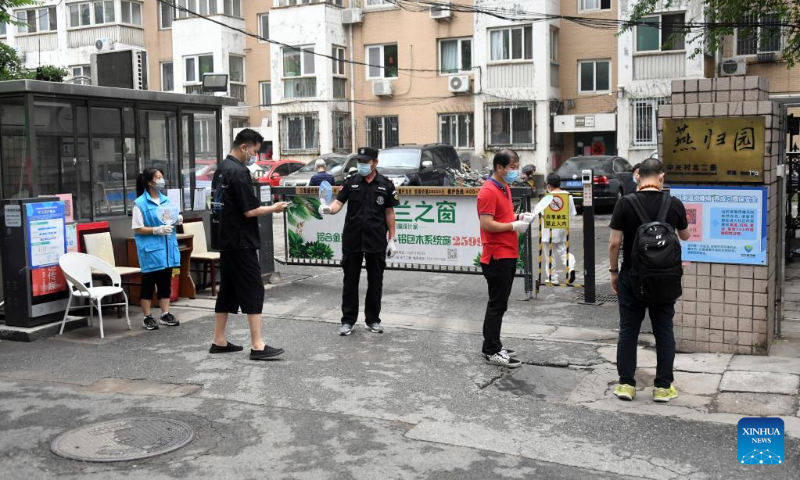Beijing's latest bar-related COVID-19 flare-up 'more difficult to contain' than 2020 Xinfadi market outbreak

Residents scan QR codes to have their health status registered at the entrance of a residential area in Zhongguancun of Haidian District, Beijing, capital of China, June 12, 2022. Beijing's Zhongguancun area has imposed stricter COVID-19 prevention and control measures amid a recent outbreak. At the community level, these include stricter visitor information registration, health code tracking, temperature check and verification of negative COVID-19 test results. (Xinhua/Ren Chao)
Beijing has once again come under the shadows of an epidemic flare-up only few days after it announced a cautious reopening of public venues. The city saw a strongest cluster infection stemming from a bar in one of its busiest downtown streets with a scale and severity larger than all previous ones, which has resulted in 166 related infections in four days.
Prevention and control of this bar-related outbreak in Beijing is more difficult than the previous wave of outbreak in the Xinfadi market in June 2020, Beijing municipal government spokesperson Xu Hejian said at a news conference on Sunday. Beijing's epidemic prevention experts warned that it may spill over to more cities.
Beijing reported 33 new infections, including two at the community level, and 13 asymptomatic infections on Sunday as of 3 pm, bringing the total number of infections to 1,997 in the latest outbreak since the first case was detected on April 22, the city's health authorities said on Sunday.
Within four days, 166 cases of infection were reported in the cluster outbreak involving Heaven Supermarket, a late-night drinking venue near Beijing's Sanlitun entertainment and shopping district. The cases had spread through 14 of Beijing's 16 district areas. This wave is more difficult in terms of prevention and control than the Xinfadi market outbreak in 2020, officials said.
More than 300 people were infected in the June to August 2020 outbreak related to the Xinfadi wholesale produce market, one of the largest outbreaks the capital city experienced in more than two years.
Experts in Beijing agreed with this serious judgment in this outbreak, noting that it risks spreading to more cities, although Beijing has done a good job reacting quickly toward the virus.
"The Omicron variant which fueled Beijing's latest epidemic spike is much more difficult to detect and has a much faster transmission speed than the prevailing variants in 2020," Wang Guangfa, a Beijing-based respiratory expert, told the Global Times on Sunday, explaining the fast transmission.
He pointed out that as more people in Beijing have been vaccinated, the chance of infected patients developing symptoms is lower. "So it is now more difficult to detect infections, leading to potential hidden transmissions."
Wang noted that Beijing's reaction this time has been very fast and thorough in identifying close contacts and people exposed to the virus.
"Since Beijing is a very large city and there is a lot of movement of people, spillover of the epidemic to other cities, especially neighboring cities, is unavoidable," Wang said. "But it is not very worrisome because of the city's experience and rapid response time."
A case connected to this outbreak has already been tracked to Sanhe, North China's Hebei Province which borders Beijing to the east. The city has been put under temporary static management, which will be lifted if the results of the three rounds of citywide nucleic acid testing from Saturday to Monday are all negative.
"Beijing has done a good job this time in doing an epidemiological survey for each infected patient, and this is the key to bringing current risks under control and preventing the virus from spreading," Wang said.
Currently, Beijing is fast-tracking the crowd screening. Bars, KTVs, internet cafes and other establishments have been suspended and subjected to risk screening. Back-to-school dates for elementary school and most middle school students have also been postponed.
Mass nucleic acid testing will continue for key populations, industries and regions. From Monday to Wednesday, residents of Chaoyang district will undergo three consecutive rounds of mass nucleic acid testing. Fengtai district announced that it will test residents in communities associated with infections and in areas close to them for three consecutive days.
"Multiple rounds of nucleic acid testing remain the most effective way to screen for hidden transmission risks at the community level," Meng Rui, deputy mayor of Chaoyang district, said at the conference on Sunday.
Beijing will carry on with dynamic and accurate epidemic coping measures instead of shutting down all public venues as it did in previous static management in most districts, Wang said.
Photos
Related Stories
- Beijing registers 33 confirmed local COVID-19 infections
- Chinese mainland reports 122 new local confirmed COVID-19 cases
- Beijing's bar-related COVID-19 infections rise to 115
- Chinese mRNA-based COVID vaccines effective in preclinical trials
- Beijing reports 34 confirmed, 31 asymptomatic local COVID cases
Copyright © 2022 People's Daily Online. All Rights Reserved.









